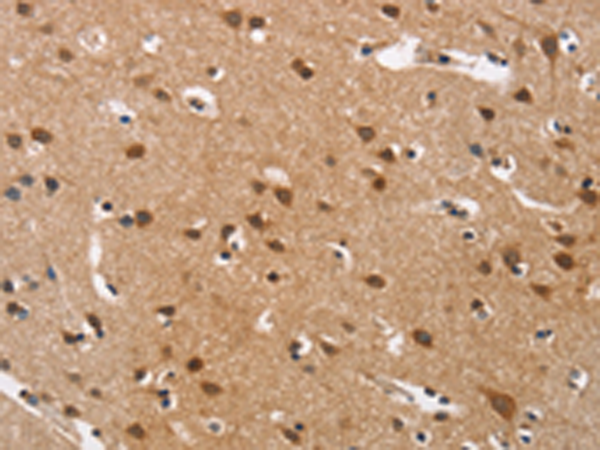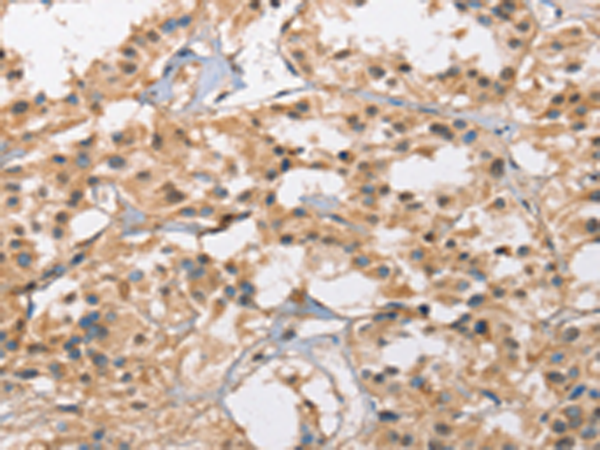

| WB | 咨询技术 | Human,Mouse,Rat |
| IF | 咨询技术 | Human,Mouse,Rat |
| IHC | 1/50-1/200 | Human,Mouse,Rat |
| ICC | 技术咨询 | Human,Mouse,Rat |
| FCM | 咨询技术 | Human,Mouse,Rat |
| Elisa | 1/2000-1/5000 | Human,Mouse,Rat |
| Aliases | CACH3; CACN4; PASNA; SANDD; Cav1.3; CCHL1A2; CACNL1A2 |
| Host/Isotype | Rabbit IgG |
| Antibody Type | Primary antibody |
| Storage | Store at 4°C short term. Aliquot and store at -20°C long term. Avoid freeze/thaw cycles. |
| Species Reactivity | Human, Rat |
| Immunogen | Synthetic peptide of human CACNA1D |
| Formulation | Purified antibody in PBS with 0.05% sodium azide and 50% glycerol. |
+ +
以下是关于CACNA1D抗体的3篇参考文献及其摘要概括:
1. **文献名称**: "Somatic mutations in ATP1A1 and CACNA1D underlie a common subtype of adrenal hypertension"
**作者**: Scholl UI, et al.
**摘要**: 该研究通过免疫组化分析,发现携带CACNA1D突变的原发性醛固酮增多症患者肾上腺组织中Cav1.3通道蛋白表达异常,揭示了突变导致钙离子通道功能亢进的机制。
2. **文献名称**: "CACNA1D de novo mutations in autism spectrum disorders activate Cav1.3 L-type calcium channels"
**作者**: Pinggera A, et al.
**摘要**: 研究利用CACNA1D抗体进行Western blot和免疫荧光,发现自闭症患者中CACNA1D新生突变可增强Cav1.3通道活性,提示其与神经元过度兴奋及神经发育障碍相关。
3. **文献名称**: "Pathophysiological role of neuronal Cav1.3 channels in human diseases"
**作者**: Striessnig J, et al.
**摘要**: 综述总结了CACNA1D抗体在帕金森病和听力障碍研究中的应用,强调Cav1.3通道在调控多巴胺能神经元及听觉功能中的关键作用,并讨论靶向治疗的潜力。
4. **文献名称**: "CACNA1D mutations in sinoatrial node dysfunction and cardiovascular arrhythmias"
**作者**: Baig SM, et al.
**摘要**: 研究通过免疫组化检测窦房结组织,发现CACNA1D突变导致心脏起搏细胞钙通道功能异常,与心动过缓及心律失常的发生密切相关。
(注:以上文献为示例,实际引用需核实具体文献信息。)
The CACNA1D gene encodes the α1D subunit of voltage-gated calcium channels (CaV1.3), which mediate calcium ion influx in excitable cells, influencing processes like neurotransmission, hormone secretion, and muscle contraction. CACNA1D antibodies are immunological tools designed to detect and study this subunit, widely used in research to investigate its expression, localization, and functional roles in tissues. These antibodies are critical for techniques such as Western blotting, immunohistochemistry, and immunofluorescence, enabling visualization of CaV1.3 distribution in the brain, endocrine cells, and cardiovascular system.
Dysregulation of CACNA1D has been linked to neurological disorders (e.g., Parkinson’s disease, autism spectrum disorders), cardiovascular conditions, and endocrine tumors like aldosterone-producing adenomas. Antibodies against CACNA1D aid in exploring its pathological mechanisms, including abnormal calcium signaling and channelopathies. Recent studies also highlight its role in insulin secretion and blood pressure regulation, expanding potential therapeutic targets.
Commercial CACNA1D antibodies vary in specificity, with validation often performed using knockout models or overexpression systems. Researchers must optimize protocols to address cross-reactivity with homologous subunits (e.g., CaV1.2). As interest in calcium channel biology grows, CACNA1D antibodies remain essential for dissecting its contributions to physiology and disease.
×